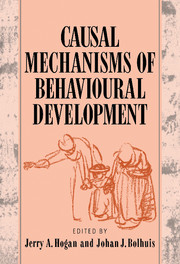Book contents
- Frontmatter
- Contents
- List of contributors
- Foreword: Introducing Jaap Kruijt
- Preface
- Part one Introduction
- Part two Development of perceptual and motor mechanisms
- Part three Development of behaviour systems
- Part four Development of cognition
- 11 Cortical mechanisms of cognitive development
- 12 Cognitive development in animals
- 13 The biological building blocks of spoken language
- Part five Learning and development
- Author index
- Subject index
12 - Cognitive development in animals
Published online by Cambridge University Press: 19 January 2010
- Frontmatter
- Contents
- List of contributors
- Foreword: Introducing Jaap Kruijt
- Preface
- Part one Introduction
- Part two Development of perceptual and motor mechanisms
- Part three Development of behaviour systems
- Part four Development of cognition
- 11 Cortical mechanisms of cognitive development
- 12 Cognitive development in animals
- 13 The biological building blocks of spoken language
- Part five Learning and development
- Author index
- Subject index
Summary
Young organisms cannot do many of the things that adults can, and some of these things are cognitive in nature. Very young humans cannot understand or produce speech very well. Young animals cannot recognize predators or collect food at the adult level of proficiency. Young humans, however, develop the ability to understand and produce speech at a rate that is scarcely believable, and young animals can learn to forage and avoid predators, as well as form social attachments, learn to communicate, and learn to orient themselves in the world, sometimes by means that are not available to adults. This chapter offers a highly selective review of cognitive development in animals, concentrating on a few questions. The two fundamental questions are, do animals have ‘cognitions’, and do they change ontogenetically? The next question concerns the nature of cognitive development. Cognitive development clearly involves a multitude of changes in behaviour and the nervous system. This discussion will emphasize that there is an important difference between the acquisition of information by naive animals and developmental change in cognitive mechanisms. Several examples, drawn from foraging, aversion learning, and spatial behaviour illustrate this distinction, and allow for some discussion in passing of developmental changes in the brain that are correlated with cognitive development.
- Type
- Chapter
- Information
- Causal Mechanisms of Behavioural Development , pp. 289 - 299Publisher: Cambridge University PressPrint publication year: 1994



